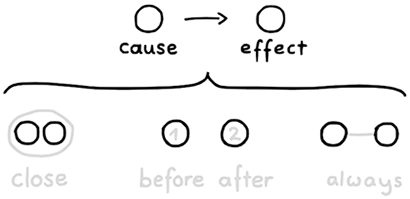David Hume—Why We Change Our Mind §

Highlights §
- As an empiricist, David Hume believed that our minds are initially ’empty’. All our knowledge comes from outside, we must observe the external world.
 (View Highlight)
(View Highlight)
- This idea is challenged by rationalists, who argue that our ability to know things comes from inside.
 (View Highlight)
(View Highlight)
- mistrust our senses and seek enduring intellectual truths, empiricists like David Hume focus on observation. The ever-changing physical environment is their main source of knowledge. (View Highlight)
- Empiricists trust that this material world around us is not just random and chaotic. What is at the core of this trust? The belief that everything was caused by something else. For example, an apple falls from a tree because of gravity. (View Highlight)
- The concept of cause and effect holds everything together. Everything is caused by something, which was in turn caused by something else… and so on. This idea is the universal glue of our material world. (View Highlight)
- Two events must be close to each other in space and time (contiguity). One of them, the cause, must come before the other, the effect (temporal priority). And most importantly: This succession of events must always happen (constant conjunction). (View Highlight)
 (View Highlight)
(View Highlight)- These three characteristics let us examine the past and predict the future! For example, when we see a human footprint in the sand, we can assume that somebody has walked there in the past.
 (View Highlight)
(View Highlight)
- Here is his explanation: Imagine you witness one billiard ball hit another. You see the first ball moving—then you hear a smacking sound. The first ball stops to a halt, while the second ball starts to move. Why did the second ball move? Because it was hit by the first one. We assume a necessary connection. (View Highlight)
- Whenever we see events happen one after another often enough, we believe there’s a connection. This is not a rational justification! But a little caution is in order. Hume does not doubt that everything is connected by cause and effect. He just points out that this is an assumption based on habit, not on compelling rational logic. (View Highlight)
- Deduction
We start with general principles and draw specific conclusions. (View Highlight)
- A second kind of argument starts with specific examples and guesses a general rule (View Highlight)
- This kind of argument is called induction. It is based on probability, not on certainty.
In short, deductions move from general rules to specific cases with certainty, while inductions move from specific cases to general rules with probability. (View Highlight)
 (View Highlight)
(View Highlight) (View Highlight)
(View Highlight)- When we observe phenomena in the material world to discover rules or ‘natural laws’, we use inductive reasoning. Hume’s discovery was that this kind of inductive thinking is not based on reason but on a feeling that the future resembles the past. As a result, every scientific theory we develop is just that: a theory. (View Highlight)
- Our habit to assume causal connections when we observe things repeatedly can also explain our inclination to superstition or to accept lies if they are repeated often enough (View Highlight)

 (View Highlight)
(View Highlight) (View Highlight)
(View Highlight) (View Highlight)
(View Highlight) (View Highlight)
(View Highlight) (View Highlight)
(View Highlight) (View Highlight)
(View Highlight)